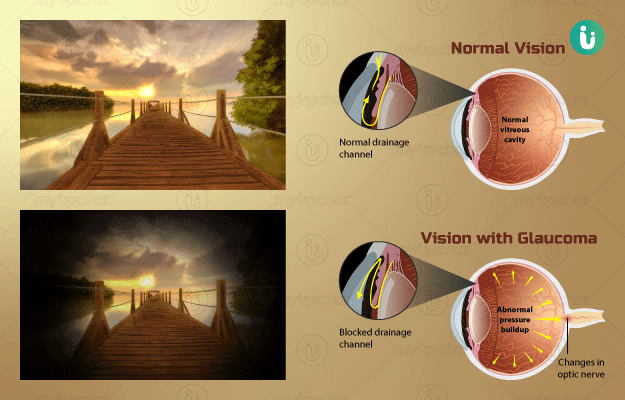What is Glaucoma?
Glaucoma is a disease in which optic nerve gets damaged due to increased pressure in the eye. When extra fluid increases pressure in the frontal part of the eye it is termed as glaucoma. Glaucoma is of two types:
- Open-angle glaucoma- This is the most common type of glaucoma and is also called wide-angle glaucoma.
- Angle-closure glaucoma- This is less common and also called acute or chronic angle-closure or narrow-angle glaucoma. It is generally associated with cataract and farsightedness.
What are its main signs and symptoms?
The signs and symptoms of this disease are so mild that they go unnoticed for a long period of time. The very first sign is often the loss of peripheral vision.
Below are the symptoms of glaucoma:
- Seeing halos around light-emitting objects.
- Vision loss.
- Redness in the eye.
- An eye that looks hazy (in infants).
- Itchy and painful eyes.
- Narrowed or blurred vision.
- Nausea and vomiting.
What are the main causes?
The increased eye pressure because of extra fluid is the reason for glaucoma. However, there are several factors that increase the risk of developing glaucoma and include:
- Age – chances of developing glaucoma increase with age.
- Ethnicity – African, Caribbean and Asian population are at a higher risk.
- Family history – There are higher chances of being diagnosed with glaucoma if any parent or sibling has it.
- Other medical conditions – like short-sightedness, long-sightedness and diabetes.
How is it diagnosed and treated?
Routine eye check-up is useful to detect eye conditions like glaucoma. To check the eye pressure, a test called tonometry is conducted. Also, a visual field test is performed to check for the loss of peripheral vision.
It is impossible to bring back the lost vision that occurred before glaucoma was diagnosed but treatment can stop worsening of the condition. Treatment depends upon the type of glaucoma. Below are the most common treatments available for glaucoma:
- Steroid eye drops – to decrease the pressure in the eyes.
- Laser treatment – to open up the blocked optic drainage tubes or lower the production of fluid in the eyes.
- Surgery – to enhance the drainage of fluid by widening a narrowed angle at the corner of the eye.

 Doctors for Glaucoma
Doctors for Glaucoma  OTC Medicines for Glaucoma
OTC Medicines for Glaucoma
 Glaucoma articles
Glaucoma articles

 Homeopathic Treatment of Glaucoma
Homeopathic Treatment of Glaucoma







 Dr. Rachita Narsaria
Dr. Rachita Narsaria











